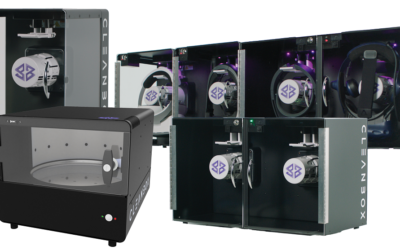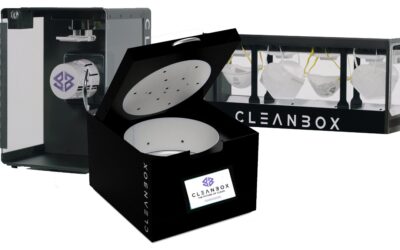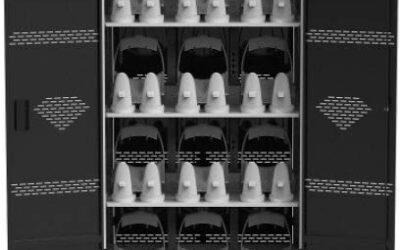Eyewear shops have an obligation to provide a sanitary environment to consumers who want to try on various glasses and sunglasses. But sanitizing eyewear can be challenging because of the delicate materials used to create these assistive devices. However, the power and efficacy of UV cleaning boxes from Cleanbox Technology can thoroughly decontaminate glasses used at the point of sale in eyewear shops.
How Point-of-Sale Eyewear Shops Can Improve Sanitation and Lower Costs
It’s important for eyewear used at point-of-sale terminals to be disinfected regularly. Every day, individuals try on various frames to assess style and appearance, and these germs can add up. When viral and bacterial particles are allowed to remain on the surface of eyewear, the risk of infection to customers and employees is much higher.
Daily UV Sanitation
The most obvious way eyewear shops can improve sanitation for eyeglasses and sunglasses is to implement daily UV sanitation with UV cleaning boxes. Daily sanitation of all eyewear in the shop will ensure that there are no viral or bacterial pathogens that can potentially spread infection.
This is a good approach since eyewear shop employees may not be aware of all glasses that customers touch. By sanitizing all eyewear in the shop, it’s much easier to prevent infections and other outbreaks. Daily UV sanitation can be easily done with CleanBox, and multiple units can be used at one time to disinfect the store stock.
UV Sanitation After Individual Use
Eyewear shops can also use cleaning boxes to sanitize glasses and sunglasses after each use. If employees are working with a consumer who’s trying on multiple pairs of glasses, these glasses can be set aside and immediately disinfected after the sale is closed. This ensures that the eyewear is sanitized immediately to cut down on potential contagion.
UV Sanitation Is More Cost Effective
Instead of paying for disposable cleaning wipes, shops can use a single sanitation tool to meet all cleaning needs for glasses and sunglasses. Additionally, rough treatment during traditional cleaning methods may damage frames and cause eyewear shops to replace frames, which can damage the shop’s bottom line.
What Are Potential Eye Infections From Contaminated Eyewear?
There are several potential eye infections that can occur from wearing contaminated eyewear, particularly eyewear that a shared among multiple people, such as those at eyewear shops.
For example, conjunctivitis or pink eye can easily be spread by touching eyewear that contains bacteria and then touching the eye. Other common eye infections from contaminated eyewear can include blepharitis, vitrititis, and keratitis. Each of these infections can be painful and difficult to treat. If left untreated, severe infections may even impact vision and quality of life.
Why UV Cleaning Boxes Are Better Than Alcohol Wipes for Glasses
In addition to UV cleaning boxes being more cost-effective than alcohol-based wipes and other cleaning wipes, there are several reasons why eyewear shops may want to rely on UV sanitation. For example, cleaning with alcohol-based wipes is a much slower process than using a UV sanitation box. Wiping glasses off by hand can take several minutes, whereas sanitizing glasses with UV LED light takes 60 seconds. Consider also:
Wipes Aren’t Totally Effective
Although alcohol-based wipes promise to be 99% effective in killing bacterial and viral particles on hard surfaces, the fact of the matter is that these wipes are only effective if they are used correctly. For example, if an employee is cleaning frames half-heartedly and misses a portion of the eyewear, it’s possible for viral and bacterial particles to linger.
Furthermore, the hinges of glasses and the nose pieces on eyewear contain many small cracks and crevices that can be difficult to clean with alcohol-based wipes. A UV LED sanitation box, on the other hand, can kill germs in even the smallest places.
Wipes Can Damage Lenses
At home, consumers are instructed to never clean eyewear with corrosive cleaning products, which can include alcohol-based wipes. So, if a consumer isn’t allowed to use alcohol-based wipes or other cleaning wipes to disinfect their glasses at home, why are eyewear shops relying on these harsh chemicals?
The best way to preserve the integrity of eyewear is to use non-acidic, non-corrosive chemicals. However, many of these gentler chemicals are not adequate for decontamination. Sanitation boxes, on the other hand, can decontaminate all surfaces without risking damage to the lenses. This can be particularly important for prescription lenses.
Wipes Can Damage Frames
Alcohol-based wipes and other cleaning products can potentially damage frames. Eyewear frames are made of various materials, and resin frames are by far the most delicate. The material can weaken over time if alcohol-based wipes are used on resin frames. This can cost the eyewear shop money to replace damaged frames, and it can even change the color or design of the frame, which may make the eyewear less attractive to consumers.
How Cleanbox Disinfection Works
Cleaning box disinfection is ultimately a simple process. First, the eyewear shop employees will select the eyewear that needs to be cleaned. This eyewear will be placed into the UV LED decontamination box and a cleaning cycle will be selected. After the cleaning cycle has finished, which can take anywhere from 60 seconds to 120 seconds, the eyewear is considered decontaminated and is safe for use again.
UV Light Kills Germs
For several years, scientists have been aware that UV light has a germicidal effect on bacteria. Research also indicates that UV light can kill viral particles after enough exposure. For example, research during the pandemic revealed that UV LED radiation could kill COVID-19 viral particles when exposed to an adequate amount of UV radiation.
UV LED light is much more effective than UVC light, which takes longer to kill viral and bacterial particles. Furthermore, UV light is capable of destroying 99.999% of all germs, even on softer surfaces. This makes UV sanitation boxes much more efficient and effective for sanitation purposes.
UV Light Quickly Decontaminates
UV light can quickly decontaminate multiple pieces of eyewear at one time. What would ordinarily be a process that could take an hour or more to complete can be finished in only a few minutes when cleaning boxes are used at eyewear shops.
Instead of employees scrubbing and buffing eyewear, they can use the 60-second speed of the clean cycle for individual eyewear or use multiple sanitation boxes at one time to decontaminate eyewear for the entire shop.
UV Light Is Thorough
UV light is much more thorough at cleaning than humans are. In addition to light decontaminating surfaces in the smallest nooks and crannies of eyewear, sanitation boxes will remain diligent throughout the sanitation process for multiple pieces of eyewear, whereas humans may clean less thoroughly as time goes on. Ultimately, this means that UV LED sanitation boxes are more reliable than human cleaning abilities.
Eyewear shops may want to use the power of cleaning boxes at the point of sale. After consumers try multiple pairs of eyewear, employees can quickly sanitize these frames to reduce the risk of viral and bacterial infections spreading among other consumers and fellow staff. For more information on how eyewear shops can improve sanitation at the point of sale, contact Cleanbox Technology today.





